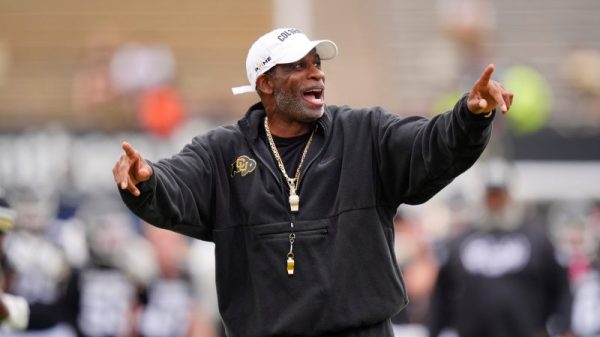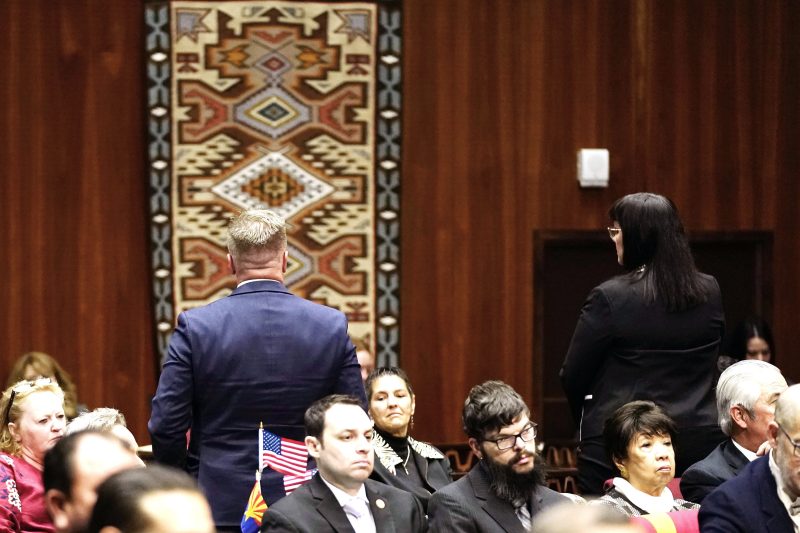PHOENIX — As Republicans in Arizona’s largest county gathered earlier this month, the routine task of choosing new party leadership and setting priorities for the year ahead devolved into chaos.
Assembled inside a megachurch, longtime local party leaders beseeched the crowd of hundreds to mark their choices on ballots and trust machines to count them. Some in the crowd, suspicious of the accuracy of the equipment, demanded their votes be counted by hand.
For about two hours, they fought over which method was the right one. Some jumped out of their seats and waved their arms in dismay as they demanded hand counts. Others hissed and screamed. From the stage, a party leader shouted back as she struggled to maintain control.
Just a few months ago, Arizona Republicans lost nearly every major statewide midterm race after campaigning for months on false claims that the 2020 election was stolen from Donald Trump. That was not always a winning strategy in Arizona or in many other states, but many Republican leaders and their supporters here are still clinging to election-fraud falsehoods, refusing to acknowledge that their candidates lost and resisting attempts to lessen the extreme divisions in the state.
The recent Saturday gathering of the Maricopa County Republican Committee to pick new leadership could have been a day of reflection, but it instead showcased how conspiratorial claims of voter fraud remain a litmus test for leaders in the GOP’s state and local party apparatus.
The day was a preview of the fight to come this weekend when the state Republican Party convenes to select new leadership and priorities ahead of 2024. That meeting, set to unfold in the same megachurch, will test the power of new grass-roots activists versus a more tenured pragmatic faction focused less on litigating past elections and more on winning ones in 2024.
By the end of the night, when county activists had to leave the church’s inner sanctum, it was unclear who would lead the county party, a frustrating end for some so focused on having elections that begin and end on a single day. Eventually, the ballots were counted both ways, and the race for chair was called for Craig Berland, who campaigned on getting rid of the machines. Berland was part of a slate endorsed by prominent election deniers Mike Lindell, the founder of a pillow company; state Sen. Wendy Rogers (R), the new chair of the chamber’s election committee; and Kari Lake, the Trump-backed GOP candidate who lost her own campaign for governor and has refused to concede.
While Democrats narrowly swept key statewide offices, Republicans maintained vulnerable one-vote advantages in the state House and Senate. Some of those lawmakers have pledged to work against Gov. Katie Hobbs, the Democrat who beat Lake by more than 17,000 votes. Before she took office, Lake supporters dubbed Hobbs the “Governor-Select,” a riff off “Governor-Elect” and a disparaging moniker intended to sow doubt about the legitimacy of her win.
In Arizona, long a breeding ground for conspiracies, many Republicans who do not trust democratic institutions said the midterm outcomes only deepened their disillusionment.
“If you’re going to tell me somebody like Joe Biden beat Donald Trump, you’re delusional,” Georgia Cifelli-Amster, 62, a GOP activist and business owner from Scottsdale told The Post. “And if you think somebody like Katie Hobbs beat Kari Lake, you are certainly delusional.”
Nowhere is Arizona’s political divide more evident than on the floor of the state House, where Republicans and Democrats once sat alongside each other. A new seating chart took effect this session that put GOP members on one side of the chamber and Democrats on the other.
House Majority Whip Rep. Teresa Martinez (R), who crafted the chart, said she wanted to “surround people with experience and trusted faces they already knew.” She later told The Post the plan could encourage bipartisanship by prompting members from both parties to literally cross the aisle.
The midterm elections ushered in 41 freshman lawmakers at the state Capitol, one of the largest crops of new or returning members in modern history. Of those, 25 are Republicans. Some have explicitly questioned election results, and about half appear sympathetic to the newly launched “Arizona Freedom Caucus,” an unofficial assembly of lawmakers who appear aligned with Trump’s agenda and combative approach to more traditional GOP members in leadership. The group does not publicly identify all of its members.
On the opening day of the state legislature on Jan. 9, Republican lawmakers gathered with the caucus leader for a news conference, where they vowed to oppose Hobbs’s “woke agenda.” In the background, supporters yelled that she was not a legitimate governor. Modeled after the U.S. House’s ultraconservative Freedom Caucus, the state bloc aims to press moderate Republicans and Democrats more to the right.
That afternoon, members crammed onto the House floor for the beginning of a new session, a pomp-filled ceremony steeped in patriotism — and partisanship. Members took turns introducing themselves and their guests. State Rep. Alexander Kolodin (R), a new lawmaker and an attorney who has represented the state party chair as part of the federal investigation into attempts to overturn the 2020 election results, said he would work collegially with those who want to secure elections and defend freedoms.
“If you, instead, take the contrary position,” he continued, speaking into a microphone, “then you’ll find no worse enemy.”
The new House speaker, state Rep. Ben Toma, a traditional conservative, acknowledged the divided environment. He invited Hanna Zack Miley, a Holocaust survivor, to share her path toward reconciliation over her parents’ deaths at the hands of Nazis when she was a child. In a quiet voice, to a hushed crowd, she described opening her heart. “I can still remember the lifting of that dark weight as I gave that weight to Him,” she said.
It’s one thing to forgive internally, she told members. It’s another to consciously experience lasting reconciliation.
But some in the divided chamber seemed uninterested in reconciliation. When Hobbs walked into the chamber to deliver her first State of the State address, the view from the gallery offered a stark visual of the factions within the GOP caucus she now must navigate.
The new governor said she would not entertain those “chasing conspiracy theories” or efforts to undermine trust in democratic functions. As she spoke, Democrats cheered. Some Republicans clapped. Others scrolled on their cellphones or clasped their hands together atop desks.
As the speech progressed, hostility built. As Hobbs repeated a campaign pledge to increase funding for public education, two Republican lawmakers stood and turned their backs on the governor. When Hobbs said she would protect abortion rights — earning an ovation from liberal lawmakers — Republicans aligned with the Freedom Caucus began walking out.
Afterward, some Republicans accused Hobbs — who was previously the secretary of state and oversaw the 2020 and 2022 elections — of ignoring problems with the state’s election systems. With their newfound power, some GOP lawmakers have made clear their intent to double down on challenging recent election outcomes. State Rep. Liz Harris (R), a newcomer to the legislature who has spread election conspiracies, recently called on lawmakers to demand a new 2022 election.
“I will now be withholding my vote on any bills in this session without this new election in protest to what is clearly a potential fraudulent election,” she said in a November statement. She has since cast votes and introduced legislation to outlaw early voting. She declined to speak to The Post.
Activists, lobbyists, local officials and others are slowly learning how to navigate this divided legislature that is packed with newcomers.
State Rep. Justin Heap (R), who ran on a slate that included several election deniers, recently received an email from a lobbyist seeking to meet with him. In responding, he asked whether the firm she works for had financially supported his campaign.
“I need to prioritize which meetings I can take,” he wrote in the email obtained by The Post through a public records request. “May I ask you, Did Consortium [sic] Consulting donate to my campaign fund? And if not, why did you (or your clients) decide not to do so?” Heap did not respond to The Post’s request for comment. A Consilium Consulting owner declined to comment.
Republicans at the legislature this week unilaterally changed rules, making it more difficult for the public to access such emails that offer insight into how they operate.
Rogers, who has parlayed election falsehoods into a fundraising bonanza, now presides over the state Senate’s election committee. This week, she allowed a GOP activist, who just won a leadership position with the county GOP, to press unproven claims about the November election.
Lake then cited the activist’s claims during an interview with Stephen K. Bannon, the former Trump strategist and far-right radio host.
On Saturday, the Arizona Republican Party will gather to select its leaders and plot its future. Kelli Ward, who has chaired the party since 2019, is not running for reelection. The six-way race to replace her is unpredictable. It includes Jeff DeWit, the former state treasurer who served as Trump’s chief operating officer during his two campaigns; Steve Daniels, head of the Patriot Party of Arizona who has taken on the GOP from the right; and Sheila Muehling, the party treasurer who has campaigned on her deep knowledge of the party’s operations and her opposition to Ward’s spending and management.
State committee members will also consider resolutions, which are not binding but express the will of the party. One would censure Maricopa County’s Republican supervisors and recorder who presided over the 2020 and 2022 elections.
Another resolution called on the party to accept the results of Joe Biden’s win in Arizona in 2020. It requested that the party “not belabor or try to overturn old elections.” It did not muster enough support from a party resolutions committee to even be considered at the GOP meeting.



























